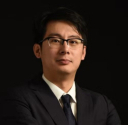Jianbo Wang is a part-time student on the MSc Education Assessment course, and a maths teacher at the United World College in China. Prior to studying at the department, he completed his Electrical and Electronic Engineering degree at Nanyang Technological University in Singapore.
What degree did you apply for and why was it important to you to study this?
After teaching mathematics for eight years, I have an understanding of the many assessment methodologies, and the pedagogical impact on my students’ assessment practises has been extraordinary. This is why I am applying for part-time studies. In addition, I enjoy conducting research after work and reading the academic articles related to my area of expertise in educational assessment.
What do you hope to go on to do once you’ve completed your postgraduate degree? What do you hope to achieve?
After completing my masters degree, I intend to publish a paper on the mathematics internal assessment.
What do you most value about the teaching at the department?
The research experience used as a formative assessment has been the most beneficial aspect of the department’s teaching. The tutor gave me in-depth comments on my work and the changes I made to my write-up.
Why do you think it’s important to study education?
Understanding the theoretical underpinnings of educational evaluation is crucial, in my opinion, in order to support teachers’ actual teaching practises. The reading lists for education demonstrate various viewpoints on educational methodologies from various academic views.
What’s the community (student & staff) like at the department?
The staff and students are really friendly. The classmates can offer an insider’s view at the research issue from several perspectives because they have extensive work experience.
What has your degree taught you most?
I’ve learned the most from my degree about how to write a thesis logically and academically.
What’s your favourite thing about studying at the department?
The process of drafting an assignment and writing about the structure to address the research questions I have posed is my favourite aspect of attending the programme.
How has the department supported you through your study?
The tutor has supported me through the supervision and provided feedback on my drafts.
What advice would you give to new postgraduate students on how they can get involved in the department community?
My advice is to start reading the reading lists as soon as you can and to make a plan to keep things moving along the way.
What further opportunities have you gained so far through or as a result of your degree?
With regard to the future publishing of my work, I have the opportunity to cooperate with a scholar.
Did you receive any financial help through the University and if so what was it?
Due of the pandemic in Singapore, the university gave me the Covid-19 fund. My research was financially supported, allowing me to continue gathering data and presenting the findings.

Understanding the theoretical underpinnings of educational evaluation is crucial, in my opinion, in order to support teachers’ actual teaching practises.





